
“If you read, you can learn to think for yourself.” Those words came from esteemed novelist Doris Lessing some years ago, when speaking of the value of public libraries and their role in creating an informed citizenry. I’m from a small town, where the public library was one rather small room, part of a combination City Hall and fire station. Its librarian, Edith Thiele, offered me my first job when I was in second or third grade -- on Saturday afternoons, I was paid a quarter to reshelve books. (This was an informal arrangement that Ms. Thiele could cover out of her book fines fund.) The job was about a lot more than reshelving books: I learned about the organization and alphabetization of books in categories, and I handled books for children, youth, and adults. A side benefit of the job was that I could take home as many books as I wished each week – which led to the kind of independent thinking that Doris Lessing was talking about. Though I gave up that job after several years, my affinity for reading and libraries has its roots there.
Years later, I was elected to the board of the Seattle Public Library Foundation. I spent eleven years on the board, with a keen interest in technology and access at a time when the Seattle Public Library Foundation supported an expansion of its online collection and introduced two library levy campaigns. When I testified on behalf of the annual library budget in front of the City Council, I held up my old red library card and reminded everyone that the public library is the most democratic of our institutions and that it does not care about your age, sex, race, or gender. For most of my time on the foundation board, the public library was unchallenged by those who wish to censor what we read.
I have always been proud of the work that the foundation does to support the library, but never more so than I am now, when Chief Librarian Tom Fay announced recently that the library had joined the Brooklyn Public Library to participate in the “Books Unbanned” initiative:
“We are the second library to join this initiative and make our collection available to teens and young adults facing book bans, censorship and political challenges in their local school and public libraries.”
This program will be supported by the Seattle Public Library Foundation rather than through the library’s regular budget. It is open to anyone aged 13-26 who lives in the United States by filling out an application for a card. The card will allow up to ten books or audiobooks to be checked out at a time from the library's 215,000 unique titles and 700,000 e-books.
In its “Freedom to Read Statement,” The American Library Association’s identifies the problem: “The freedom to read is essential to our democracy. It is continuously under attack. Private groups and public authorities in various parts of the country are working to remove or limit access to reading materials, to censor content in schools, to label "controversial" views, to distribute lists of "objectionable" books or authors, and to purge libraries. These actions apparently rise from a view that our national tradition of free expression is no longer valid; that censorship and suppression are needed to counter threats to safety or national security, as well as to avoid the subversion of politics and the corruption of morals. We, as individuals devoted to reading and as librarians and publishers responsible for disseminating ideas, wish to assert the public interest in the preservation of the freedom to read.”
Tonight, my information ethics course will focus on the First Amendment. Though our focus will be primarily upon the section that includes “abridging the freedom of speech, or of the press; or the right of the people peaceably to assemble, and to petition the Government for a redress of grievances,” it is impossible to discuss these rights without also touching on censorship, whether practiced by government or private citizens.
The current wave of book banning, of threats of fines or arrest of librarians who do not cooperate with this latest display of ancient fears over intellectual freedom is simply intolerable.
Originally Published in ASA News & Notes May 8, 2023









